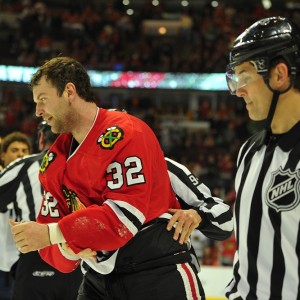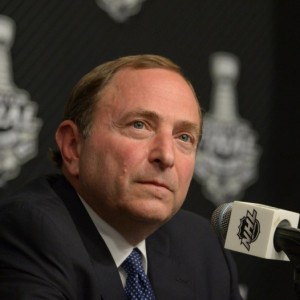John Scott is currently on track to play in the NHL’s All-Star game. He is leading the fan voting to become a team Captain. Nothing can do a better job of pointing out to the NHL brass how badly they’ve messed up.
As perhaps the sole hockey writer who has actually written an article praising John Scott (In Praise of John Scott), I find his All-Star candidacy to be, well, wonderful. For all the wrong reasons.
The Key Questions
John Scott is not a good hockey player, and any recitation of the statistics or review of highlights would make that plenty clear. He is only in the NHL for one reason. He is a deterrent to other teams; he is an enforcer. Many have questioned if that fighting role really exists in today’s NHL. More have questioned that, to the extent the role does exist, shouldn’t it be on its way to obsolescence?
The Not Pretty Answers
The answer to the first question is that enforcers are part of the game. In my article on Scott, I noted the drop in cheap shot injuries suffered by Sharks players in San Jose.

Some Blackhawks fans attribute Scott’s presence in the line-up as a turning point in their series against Vancouver in 2011. Down 2-0 in the series, coach Joel Quenneville inserted Scott into Game 3, which the Blackwhawks lost. In Game 4, the Blackhawks won while Scott managed to get into tussles with all three of the Vancouver choirboys: Tanner Glass, Raffi Torres and Maxim LaPierre. Legend has it that Scott’s presence helped to slow down the bullying from Canucks on players like Jonathan Toews and Patrick Kane. The series would go seven games, with Vancouver winning the finale in overtime. Scott played in games 3-6 in the series; Chicago won three of the four in which Scott played.
There is at least anecdotal evidence to support the enforcer role.
The answer to the second question is subtle and more important. Yes, enforcers should be on their way out. Let me rephrase that question to account for the subtlety. Why aren’t enforcers on their way out more rapidly?
The answer to that question matters a lot. And it lands squarely on the doorstep of the NHL brass. It comes down, ironically enough, to the questionably named Department of Player Safety (DPS). I’ve commented on player safety before, including articles on Raffi Torres and hypocrisy in the DPS. The article on John Scott mentioned earlier had a lengthy section on the DPS. To summarize, there are ways the DPS could act that would minimize the role of fighting in the sport, which would quickly lead to the end of the enforcer role. And there would be no John Scott sorts in the NHL.
The only reason John Scott has an NHL job is because the DPS refuses to do their job. Scott, it should be noted, seems to have a very healthy grasp on the reality surrounding the voting and his role in the NHL.
The NHL All-Star Game
Since Scott is an NHL player in good standing, he is eligible for the NHL All-Star game.
I’ll admit, I can’t even recall the last time I watched an NHL All-Star game. I’m sure it is fun to watch, but it is not for me. That said, it has been decades since I’ve watched more than a small part of any All-Star game. I appreciate the players who receive the honor of being among the best in their sport, but that is as far as it goes for me. And even then, the honors are often highly questionable.
The hockey team I write about, the San Jose Sharks, makes for a good case study about All-Star selections. Sharks defenseman Brent Burns is the Most Interesting Hockey Player in the World. He went to the All-Star Game last year. Marc-Edouard Vlasic is the Sharks best defenseman by a lot. He was not an All-Star. The difference between Burns and Vlasic is the difference between excitement and excellence. The NHL believes fans want to see excitement at the All-Star game. I won’t argue the logic. But the game is not genuinely about the best players, it is about the most exciting players. The players that the fans want to see are the players that go to the game.
Business 101
The NHL did what lots of businesses do, they decided to pander to the customer base. Let the fans vote! It’s now a part of sports and it won’t be going away anytime soon. It has always been a double-edged sword. For the most part, it has worked. Fans have taken responsibility seriously enough, often enough. Fans vote for the players they want to see, not the best players.
Very few players make an All-Star game in any sport courtesy of fan voting that are not worthy of legitimate consideration. In his final season, Cal Ripken was having an abysmal year. Yet, he was elected as a starter. He got a lengthy standing ovation prior to his first at bat, then promptly homered. Should he have been an All-Star based on his play that season? Not a chance. Did the fans get it right? Yes they did.

Fan voting opens up the window for media controversy and analysis, which is part of the life-blood of any major sport (yes, I get the irony). The problem is that every so often, this sword cuts in a direction that delegitimizes the league itself. The NHL brass created the opportunity, subversive fans have seized upon it. As a result, the NHL is a laughingstock. The league has two choices, enjoy the current uncomfortable ride or attempt to improve the situation. My guess, living with it is the better path. Trying to find ways to make this issue disappear in the years ahead is better than awkwardly overreacting in the present. It is possible, though unlikely, that Scott ultimately gets voted into the game. My guess is that NHL commissioner Gary Bettman will find a way to make the wrong choice
Ironically, it is easy to insure that voting is not hijacked for a John Scott sort. The NHL is simply behind the curve on this one.
In the bigger picture, it is really a question of whether the NHL wants to lead the fans, or be subject to their whims. A former CEO once told me that the key to his successful business was that he didn’t listen to his customers in the traditional way. He felt it was up to him to anticipate their needs, not to build what they requested. We followed through with a case study of something a customer thought they wanted, but really didn’t need. By anticipating genuine needs instead of listening to customer opinions, the CEO selected the right project and the company prospered. The NHL has a great product, but it still feels the need to pander. It is not a healthy instinct.
A Spotlight Shines
What makes John Scott, All-Star, praiseworthy? It is that it has (again) exposed fixable flaws in the NHL. There is a spotlight now shining where a spotlight is needed. Perhaps the NHL leadership will see the light and fix the issues that need fixing. I’m not holding my breath.
John Scott’s presence at the top of the NHL All-Star Game balloting exposes two important stories. Neither is about John Scott. The stories are about the failure of the NHL brass to lead and the ongoing failure of Department of Player Safety to do its core job. Still, I have to admit, the ‘John Scott All-Star’ story is a lot of fun. And if he gets into the game, I just might watch it. That is, unless my gutters need cleaning.